Constant Contact Review: User-Friendly Marketing
Best for Occasional Campaigns
If you click to purchase a product or service based on our independent recommendations and impartial reviews, we may receive a commission. Learn more
Best for
Best For Occasional Campaigns
Constant Contact is a good email marketing platform – but it’s not the best. We recommend it most for marketers who just need to send the occasional email to stay in touch with their audience, rather than run regular marketing campaigns.
We’ve spent over 160 hours researching the best email marketing platforms, so we’re in the perfect position to show you everything you need to know about Constant Contact.
For example, when we discovered that ease of use is extremely important to businesses, this area was given more weight when it came to creating our algorithm and calculating overall scores.
From our interviews with businesses and our insights into our readers’ needs, we finalized the following research categories:
- Content and functionality tools
- Marketing tools
- Design
- Value for money
- Help and support
- Customer score
- Ease of use
Aside from researching and rating each platform based on the features offered, pricing, and so on, we also got real users to test each one.
Our users tried Constant Contact themselves, creating their own campaigns and completing a set task sheet. We listened to their feedback, and used their individual ratings to calculate the final star ratings for the ease of use and customer score categories. This means each and every score in this review is based on real experiences – we’ve put over 160 hours into researching the best email marketing software, because we care about helping you grow your business!
In this review, we’ll be exploring Constant Contact’s strengths and weaknesses, along with its features, pricing, ease of use, and more to help you decide if it’s the right fit for your needs. Let’s get started!
1 Quick Overview of Constant Contact
Key Info
- Starting price: $20 per month
- Free plan: No, but a 60-day free trial is available
- Number of contacts on cheapest plan: 500
- Number of email sends on cheapest plan: Unlimited
Our users said: “I’d say this is best suited to someone who is looking to send emails a little ad hoc. For example, for updating customers on potential changes to service hours, instead of a larger promotional style of contact.”
In our research, we found that Constant Contact is perfect for part-time marketers who just need to send the occasional email to update their audience. It’s good value email marketing software that comes with some user-friendly tools, such as an awesome “Check for errors” feature, plus helpful tips to guide you as you build your campaign.
However, Constant Contact fell down when it came to its marketing features. In fact, it received the lowest score for marketing tools out of the six email marketing platforms we tested, and came joint-last for ease of use. It was also our users’ least favorite platform – it received the lowest customer score, with 3.5 stars out of 5.
Here’s a look at all of Constant Contact’s star ratings:
2 Pros and Cons
Pros
- Awesome “Check for errors” tool – highlights any mistakes that may have slipped through in your emails, such as missing links. Perfect for beginners or marketers in a rush!
- Great streamlined contact database organization – easily import contact lists directly from other accounts, such as Gmail and Outlook. You also have the choice to fill out personalized custom fields for your contacts
- Helpful, user-friendly tips – Constant Contact is all about helping you create the best email possible, and uses top tips to minimize mistakes and remind users of important steps
Cons
- Limited A/B testing options – you can only test subject lines, whereas other platforms let you test send times and content variations as well
- Poor quality template designs – while Constant Contact provides more templates than any other platform we tested, it’s a case of quantity over quality. We recommend choosing a blank template and starting from scratch
- Limited automation triggers – there are no behavior or user segmentation triggers in the automation workflow, and ecommerce automation triggers are only available to Shopify users
3 Ease of Use
Despite its user-friendly tips and useful error checker, overall, Constant Contact received a fairly poor ease of use score of 3.8 stars out of 5 from our users. This puts it in last place for ease of use compared to the other software we tested – the easiest platform, GetResponse, scored 4.4 stars out of 5 in this category.
At first glance, Constant Contact’s helpful prompts suggest that it’d be perfect for beginners. However, when we dug deeper, we found that our users struggled with a lot of its basic features.
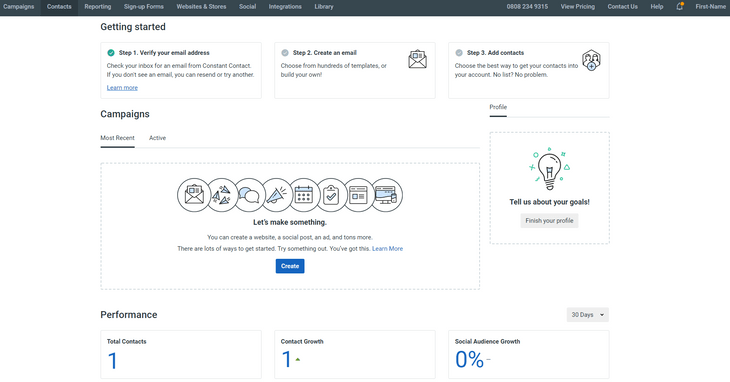
Constant Contact: The Good
Here’s what our users really liked about using Constant Contact:
“I did really like the help and support throughout, and editing the design of your email was pretty straightforward on the whole. Adding contacts was also simple, and it provided you with lots of different options to do this.”
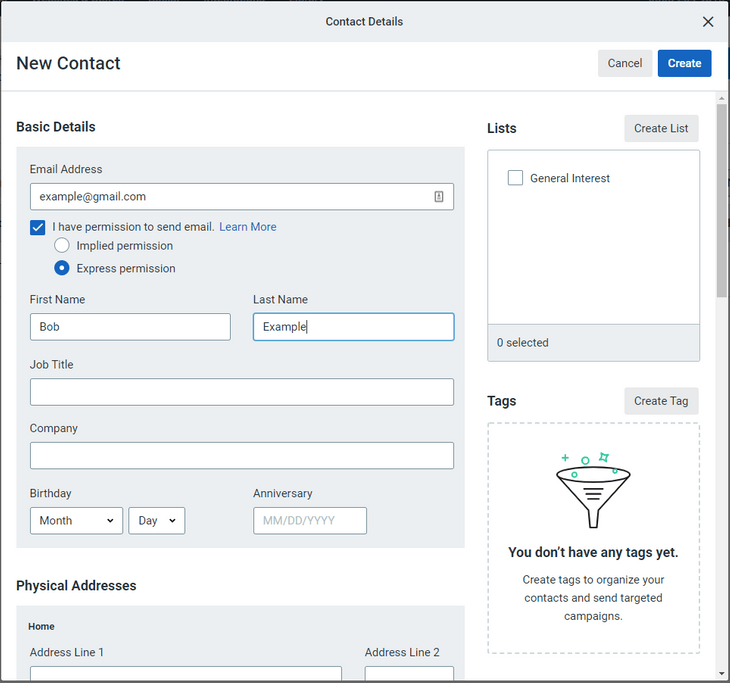
Constant Contact: The Bad
The main criticism from our users was the illogical sequence of steps for creating campaigns, and how simple tasks felt over-complicated. Here’s what our users didn’t like about Constant Contact:
“Templates were outdated and parts of the email creation process seemed illogical and confusing, as well as some features being quite restrictive (e.g. automation, email scheduling).”
Constant Contact: The Ugly
Finally, some users felt that their ease of use was hampered by Constant Contact’s outdated interface:
“I really didn’t like it. If a platform looks nice and appealing, I tend to find I have more confidence in the end product – this isn’t true with Constant Contact. Immediately I felt like this was something from 10 years ago, and which hasn’t really changed or moved on with the times.”
4 Pricing and Value for Money
Constant Contact offers great value for money. It scored 4.4 stars out of 5 in our research, making it the second best value platform we tested – in first place was ActiveCampaign with 4.6 stars out of 5, so Constant Contact wasn’t far behind!
Pricing
Constant Contact has two price plans: Email, and Email Plus. The cheapest Email plan costs $20 per month, while the cheapest Email Plus plan costs $45 per month. The price you’ll actually pay depends on the number of contacts you have, so your starting price could be higher if you already have over 500 contacts.
These are Constant Contact’s prices if you choose to pay monthly. You can also choose to pre-pay for six or 12 months, which reduces your long-term costs – in fact, you can save 15% by paying for a year in advance.
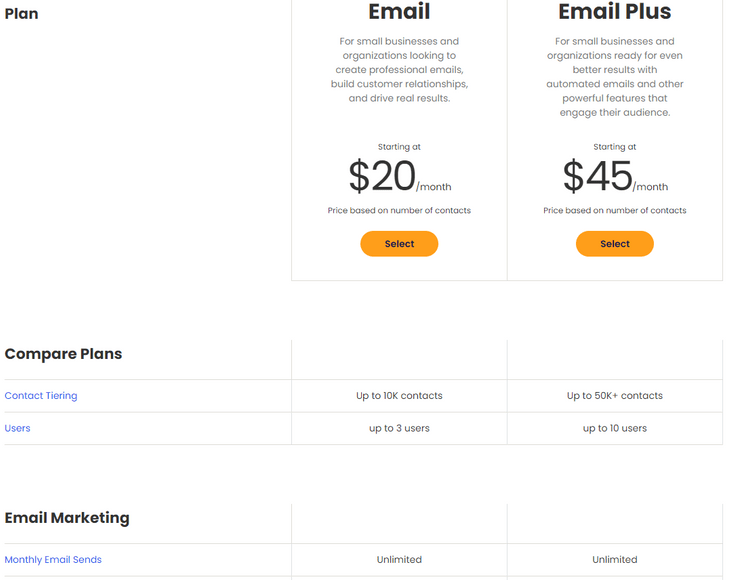
There’s no free plan, but you get a generous 60-day free trial to see if Constant Contact is right for you.
Value for Money
Constant Contact came out with a great value for money score in our research. This is down to the sheer number of features you get for your money. The cheapest plan includes:
- Unlimited number of email sends per month
- Up to three users
- Up to 10,000 contacts
- A/B testing
- Landing pages
- Transactional emails
- Social posting
- Sign-up forms
- Contacts database
- Contact list import
Constant Contact’s cheapest plan is pretty generous. For example, some platforms don’t allow A/B testing, landing pages, or send time optimization on their entry plans. The key features not supported on Constant Contact’s cheapest plan include advanced ecommerce integrations, behavior-based automations, and surveys.
How Does Constant Contact Compare to Other Platforms?
Constant Contact is more expensive than GetResponse and ActiveCampaign, but offers better value for money than GetResponse. It can’t quite match up to ActiveCampaign, though, which is cheaper than Constant Contact and offers better value for money!
5 Email Design
Constant Contact has more email templates than any other email marketing platform we tested, with 240 designs in total. It scored a respectable, if not super impressive 4.2 stars out of 5 for design in our research.
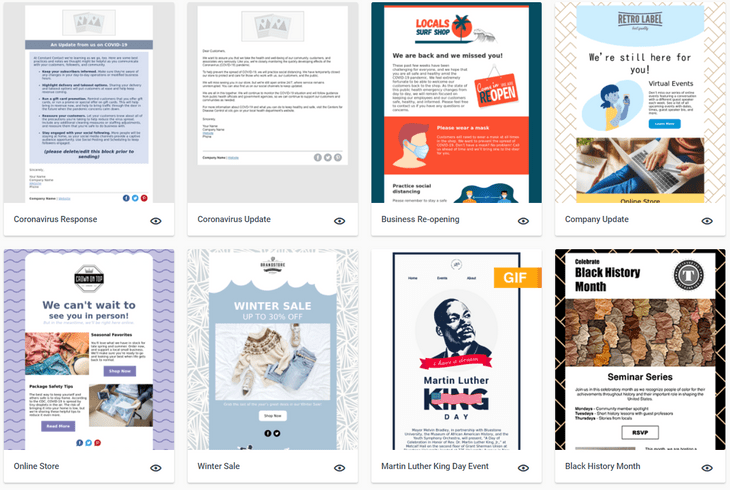
It has designs for all the key areas, including:
- Commercial campaigns
- Newsletters
- Promotions
- Surveys
However, it’s worth noting that the survey templates are reserved for users on the Email Plus plan.
Despite a seemingly good start, Constant Contact’s templates received a lot of criticism from our users. The large selection was a bonus, but the quality of the template designs was a big problem:
“All the templates look a bit outdated in terms of design and color schemes. I struggled to find a template with a modern or fresh look.”
The templates were described as “low quality”, “rubbish”, and “old school” – hardly glowing reviews from our users!
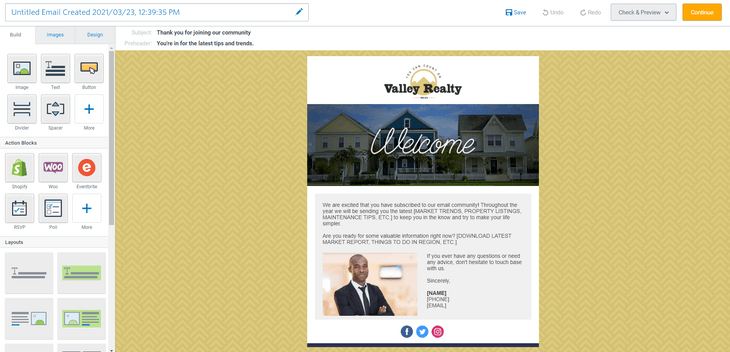
Because of this, we strongly recommend ignoring Constant Contact’s premade designs and starting from scratch with a blank template instead. This will give you more control over your email’s design, and help you create the look you want.
What Design Tools Does Constant Contact Provide?
When building your email, you have access to:
- GIFs
- Surveys
- Forms
- A free gallery of stock photos
- Mobile creation
You can use drag-and-drop or HTML editing tools to create and customize your emails. Actually building and editing emails is pretty easy with Constant Contact:
“Love the demo you get when you first enter the template, which shows you how to use the drag-and-drop function.”
“I love how the editing functions are laid out like Microsoft Word – makes it so easy to do!”
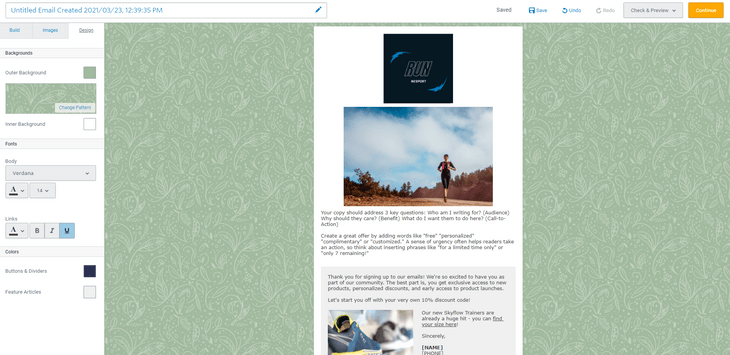
You don’t need coding skills or tech experience to create campaigns thanks to Constant Contact’s straightforward editor. This means it’s not too tricky to create your emails from scratch, rather than relying on one of Constant Contact’s email templates.
If you want a ready made, stylish template that you can customize quickly, Constant Contact isn’t the right choice for you. However, if you’re happy to create your own and have full control over your email’s design, then its outdated templates won’t be a problem.
6 Marketing Tools
Marketing tools is an area Constant Contact really fell down in, scoring just 3.6 stars out of 5 – the lowest rating we’ve seen for this area so far.
In this research category, we explored personalization, scheduling, segmentation, automation, A/B testing, and other features that help you test, run, and improve your campaigns.
So, exactly what email marketing tools does Constant Contact have to offer, and why did it earn such a low score?
Personalization Tools
Constant Contact allows you to personalize your subject lines and your send times. You can’t send personalized product recommendations, and only Shopify users can send post purchase and abandoned cart emails.
Segmentation and Automation Tools
Automation is vital for making your life easier, and ensuring your campaigns are consistent. Constant Contact allows:
- Custom workflows
- Workflow templates
- Date based automations
- Event triggered emails
However, it doesn’t support user segmentation or behavior based automation, which may hold more advanced campaigns back.
A/B Testing
The main area where Constant Contact lost points was its A/B testing options. You can only test subject line variants, and indeed, was the only email marketing tool we tested that limited A/B testing to this one variant – others also included send time, and even content variations.
For ambitious businesses, testing is vital for growth and long-term success, so the lack of testing options here is a big red flag.
Reporting and Analytics
Constant Contact ticked all the boxes when it came to analytics tools. You’ll find a full range of helpful tracking tools, including:
- Campaign analytics
- Subscriber data
- Platform tracking
- Engagement segmentation
The standout feature for us was the email click map, which shows you exactly how your users are interacting and engaging with your emails. This is really valuable data that you can use to make your campaigns more successful, and it’s not a feature included by all email marketing platforms – so it’s worthy of a shout out!
Contact Database
One feature our users particularly enjoyed was Constant Contact’s import and export feature when uploading contact lists:
“I really liked how you can upload contacts directly from a range of different email providers – from Gmail and Outlook, for example.”
All the email marketing tools we tested included an import and export feature, and this streamlined style of contact database organization helps to make your life as easy as possible when adding new contacts or managing your contact lists.
You can also add personalized custom fields for contacts, rather than being restricted to just a name and phone number.
The only drawback here is that Constant Contact doesn’t have a built-in CRM system, which could pose a problem for larger businesses.
Find out more
Do you need features to run your small business’s marketing? Check out our list of the Best Email Marketing Services for Small Business
7 Content and Functionality Tools
Constant Contact scored 3.8 stars out of 5 for its content tools. These are tools which keep your audience engaged, and let you integrate with other platforms to boost your online presence.
App Integrations
Constant Contact has an app market in case you want to add any extra features, such as Facebook signups or SMS sends. However, it’s worth noting that there are no payment services, such as Stripe or PayPal, included in the app market. In fact, Constant Contact is the only email marketing platform we tested that doesn’t have at least one payment service app!
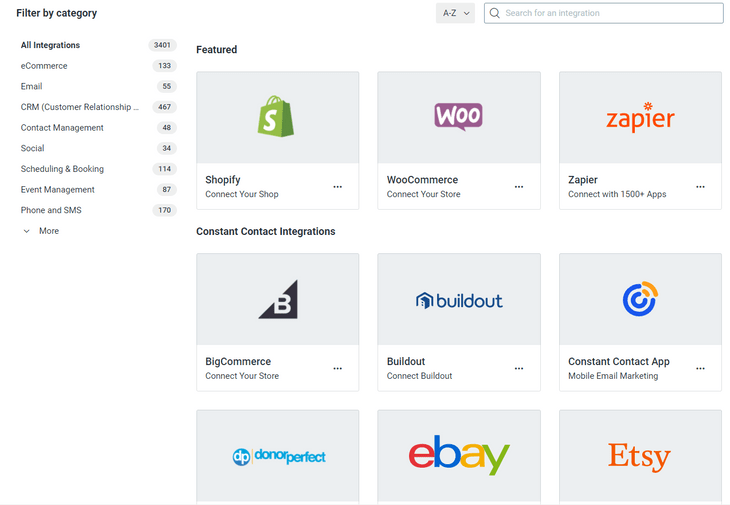
Transactional Emails
Examples of transactional emails include password reminders, custom product notifications, and purchase confirmations. Constant Contact has the basic tools to support transactional emails, such as order notifications and specific transactional email templates.
However, there aren’t any key analytics to track the success of your transactional emails, which is something to bear in mind if you’re looking to analyse and improve your campaigns over time.
Find out more
If you need top notch ecommerce features, our list of the Best Ecommerce Email Marketing Software will help you find what you need!
Social Media
When it comes to social media, you can integrate with:
- YouTube
You can have a built-in live social media feed, and create social posts directly within your Constant Contact dashboard to share straight to the relevant social account. This is ideal for creating a streamlined, consistent online presence across multiple platforms.
8 Help and Support
You can access or ask for help in a variety of ways, including:
- Phone (Monday to Saturday)
- Live chat (Monday to Friday)
- Forum
- Help center
- Video tutorials
The main support channel missing from Constant Contact is email support.
Constant Contact’s customer phone support is available Monday to Saturday, and the operating hours vary depending on the day:
- Monday to Thursday: 8am – 10pm ET
- Friday: 8am – 9pm ET
- Saturday: 10am – 8pm ET
These hours will be different if you contact specific departments such as website builder support or billing support, so we recommend checking Constant Contact’s help center for more details before calling.
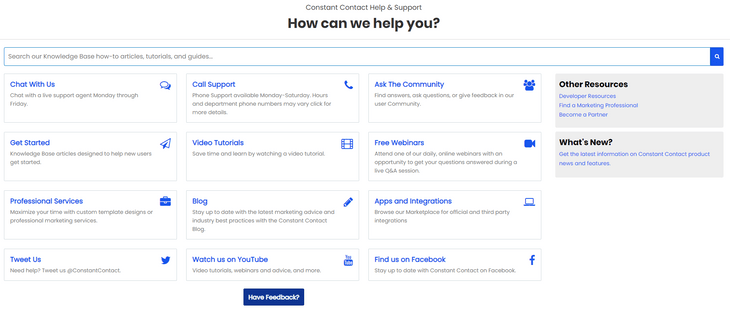
As we mentioned earlier, Constant Contact provides great support while you create your campaigns, which our users responded positively to. They reserved special praise for the “Check for errors” tool, which helps make sure you send out good quality content:
“Constant Contact has a ‘Check for errors’ tool which highlights any mistakes in your email (e.g. missing links). This is so helpful when it comes to proofing your email before sending it, as it picks up on small errors which you might otherwise miss. Love it, and not something I’ve seen any competitors offer.”
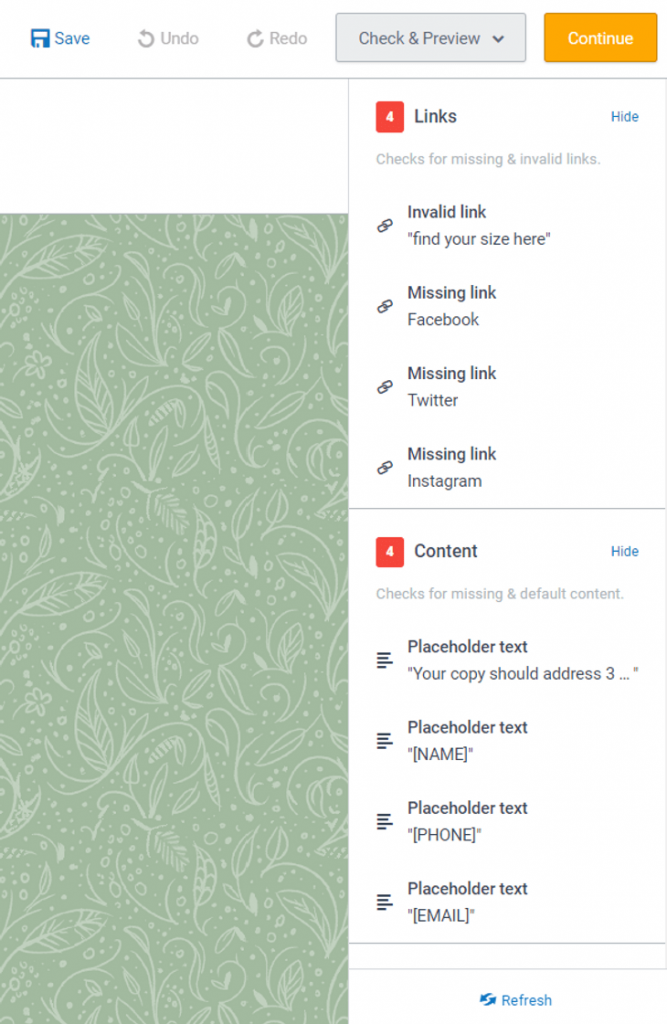
This is where Constant Contact’s help and support really shines – right there in the dashboard while you create your emails. Overall, Constant Contact scored a respectable 4.4 stars out of 5 – its lack of email support and 24/7 in-person support stopped it getting full marks.
9 Constant Contact Review Summary
Constant Contact isn’t the most powerful email marketing platform out there. It can’t support high frequency campaigns because it doesn’t have the features to test, measure, and grow ambitious marketing efforts.
However, we do recommend Constant Contact if you need to send the occasional email.
Constant Contact ticks a lot of boxes for ad hoc marketers who just need to stay in touch with their audience, rather than run regular campaigns. You may want to use Constant Contact for occasional emails, such as:
- Promoting a sale
- Updating contacts on opening hours
- Announcing a new product release
- Launching a rebrand
At the end of the day, Constant Contact is affordable and offers great value. It has really helpful prompts to guide you as you build, and its contact database is easy to manage.
Ironically, if you don’t need to stay in constant contact with your subscribers, then Constant Contact may be the perfect solution for your needs!
- GetResponse – our top-rated platform, and also the easiest to use email marketing software. If Constant Contact’s poor ease of use score is an issue, check out GetResponse instead.
- Mailchimp – best for ecommerce businesses! If Constant Contact’s features weren’t quite impressive enough, Mailchimp is worth a look (it has the best features we’ve seen so far!)


Leave a comment